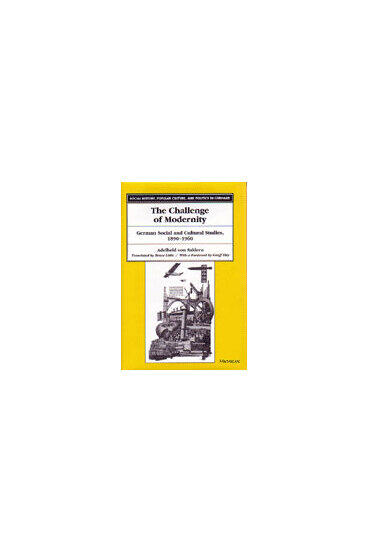The Challenge of Modernity
German Social and Cultural Studies, 1890-1960
A collection of work in translation by the celebrated, influential German historian Adelheid von Saldern
Description
Adelheid von Saldern is one of the most productive, thoughtful, and innovative researchers in the field of twentieth-century German history. Her already long career has been distinguished by a willingness to take intellectual risks by participating in new historiographical movements, borrowing from cultural anthropology, focusing on the social and cultural history of everyday life, and demonstrating the importance of gender history. In this volume, she expressly focuses on the various challenges modernity posed to German society between 1900 and 1960. Throughout, von Saldern is particularly concerned with public perceptions, debates, and attitudes.
The essays contained in The Challenge of Modernity cover three distinct subject areas: the history of the Social Democratic labor movement, housing, and popular and mass culture. More specifically, von Saldern addresses the self-modernizing Social Democratic Party; Social Democrats' and Communists' opposing views of modernization; social rationalization in the private sphere (particularly with regard to women and hygiene); sport; the arrival of "trashy" literature, movies, and radio in Germany; and cultural conservatives' attempts to enhance a national and Volks-culture in opposition to mass-culture, Americanization, and the avant-garde. The variety of responses to the modernization process, as well as von Saldern's focus on social agents, makes this book unique.
Required reading for scholars of social, cultural, and gender history, The Challenge of Modernity will also find an audience among urban anthropologists, political scientists, and sociologists. Von Saldern's ability to combine a strong theoretical framework with concrete historical examples will also make this outstanding reading for undergraduate and graduate students seeking to familiarize themselves with the history of German society and culture.
Adelheid von Saldern is Professor of Modern History and Director, Historisches Seminar, Universität Hanover.
Adelheid von Saldern is Professor of Modern History and Director, Historisches Seminar, Universität Hanover.
Reviews
". . . a valuable introduction to some significant themes in twentieth-century German social history and to the work of an important scholar."
- James J. Sheehan, Stanford University
—Central European History
"Von Saldern's research, both as represented here and in her other numerous publications, benefits historiography of twentieth-century Germany by complicating easy assumptions about the interactions between authority and the individual. Further, her mastery of the literature makes this volume a valuable resource for researchers in related fields. Aided by Bruce Little's able translation, this book is an admirable addition to the University of Michigan's Social History, Popular Culture, and Politics in Germany series."
- Mark Peach, Southern Adventist University
—German Studies Review
". . . this book is a must buy for those writing on and researching German history, as well as the social and cultural history of Europe more generally. The significance of the book is far greater, however, as the essays, when taken together, transcend their immediate geographical contexts. The great strength of von Saldern's work, as it is presented here, is that she suggests perspectives of general applicability, which means that social and cultural historians as a whole ought to take note of her ideas."
- Mark Pittaway, The Open University
—H-Net Reviews in the Humanities & Social Sciences
". . . a highly interesting and informative book that works well on several levels. The chapters can be read collectively or individually. . . . In toto, they provide insight both into the focus of von Saldern's work—labor history, gender studies, popular culture—as well as into the [sic] some of the major historiographical trends in Germany since the 1970s."
- Jessica Gienow-Hecht, Univ of Frankfurt
—Journal of Social History

